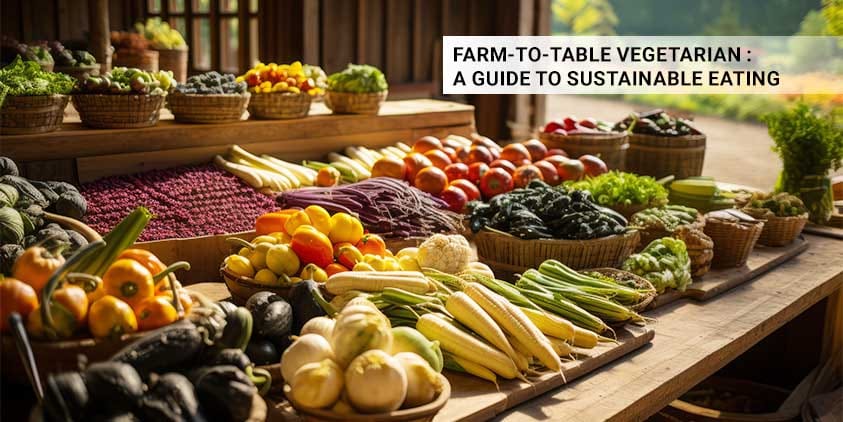FARM-TO-TABLE VEGETARIAN: A GUIDE TO SUSTAINABLE EATING

In an age where our food choices have far-reaching consequences for the planet, many people are turning to a more sustainable and ethical approach to eating. Farm-to-table vegetarianism, a movement that emphasizes locally sourced and seasonal plant-based foods, is gaining popularity for its positive impact on both the environment and our health. In this blog, we'll explore the principles of farm-to-table vegetarianism and provide you with a guide on how to embrace this eco-friendly and wholesome way of eating.
Understanding Farm-to-Table Vegetarianism
Farm-to-table vegetarianism is a concept that combines two essential ideas: supporting local, sustainable agriculture and embracing a plant-based diet. Here's a breakdown of these two core principles:
1. Local and Sustainable Agriculture:
Supporting Local Farmers: One of the key tenets of farm-to-table is purchasing your food directly from local farmers and producers. This not only supports small-scale, sustainable agriculture but also reduces the carbon footprint associated with transporting food long distances.
Seasonal Eating: Eating seasonally means consuming foods that are naturally available at a particular time of the year in your region. Seasonal produce is often more nutritious, delicious, and environmentally friendly because it requires fewer resources to grow.
Organic and Sustainable Farming Practices: Farm-to-table enthusiasts often prioritize food produced using organic and sustainable farming methods. These practices minimize the use of synthetic chemicals, protect biodiversity, and promote soil health.
2. A Plant-Based Diet:
Reducing Meat and Dairy Consumption: Farm-to-table vegetarianism places a strong emphasis on reducing or eliminating animal-based products from your diet. This not only reduces the environmental impact associated with meat and dairy production but also aligns with the ethical treatment of animals.
Diverse and Nutrient-Rich Plant Foods: A plant-based diet relies on a wide variety of fruits, vegetables, grains, legumes, nuts, and seeds. These foods are rich in essential nutrients and can form the basis of a healthy and sustainable diet.
How to Embrace Farm-to-Table Vegetarianism
Now that we've covered the core principles, let's delve into the practical aspects of embracing farm-to-table vegetarianism.
1. Know Your Local Farmers and Producers:
Visit Farmers' Markets: Farmers' markets are an excellent place to connect with local growers. You can ask questions, learn about their practices, and discover what's in season.
Join a CSA (Community Supported Agriculture): A CSA allows you to purchase a share of a local farm's harvest in advance. This often provides a diverse selection of fresh, seasonal produce throughout the growing season.
Support Local Food Cooperatives: Food cooperatives often source from local producers. By becoming a member, you can access a wide range of sustainably sourced foods.
2. Prioritize Seasonal Eating:
Learn About Seasonal Produce: Familiarize yourself with the fruits and vegetables that are in season in your region. Many online resources and apps can help you determine what's available throughout the year.
Plan Your Meals Around Seasonal Ingredients: Create meal plans based on what's in season. You'll find that dishes made with fresh, seasonal produce are not only more flavorful but also more budget-friendly.
3. Explore Plant-Based Recipes:
Experiment with Vegetarian Dishes: Explore a wide range of plant-based recipes that make the most of seasonal ingredients. Look for creative ways to prepare vegetables, grains, and legumes.
Discover Global Cuisines: Many global cuisines offer a wealth of vegetarian dishes. Explore the flavors of Indian, Mediterranean, Thai, and other international cuisines to add diversity to your farm-to-table menu.
4. Grow Your Own Food:
Start a Home Garden: Even if you have limited space, you can cultivate a small garden on your balcony or windowsill. Growing your own herbs, vegetables, or fruits is a rewarding way to connect with your food.
5. Reduce Food Waste:
Plan and Store Food Mindfully: Proper meal planning and food storage can help reduce food waste. Learn how to store different foods to extend their freshness.
Composting: Consider setting up a compost system to recycle food scraps and kitchen waste, which can be used to enrich your garden or shared with local farmers.
6. Support Sustainable Practices:
Choose Organic and Sustainable Products: Whenever possible, choose organic and sustainably produced foods. Look for certifications that ensure responsible farming practices.
Advocate for Sustainability: Support organizations and initiatives that promote sustainable agriculture and raise awareness about the benefits of farm-to-table eating.
7. Educate Yourself and Others:
Stay Informed: Continue to educate yourself about food systems, sustainability, and the impact of our dietary choices on the planet.
Share Your Knowledge: Encourage friends and family to join you on your farm-to-table journey. Share your knowledge and experiences to inspire others.
8. Be Mindful of Packaging:
Reduce Single-Use Plastics: Be conscious of the packaging of the products you purchase. Opt for products with minimal or recyclable packaging to minimize waste.
9. Reduce Your Carbon Footprint:
Transportation Choices: Minimize your carbon footprint by walking, biking, or using public transportation when shopping for food locally. These choices reduce greenhouse gas emissions associated with personal vehicles.
The Benefits of Farm-to-Table Vegetarianism
Embracing farm-to-table vegetarianism offers numerous benefits:
- Environmental Benefits:
Reduced greenhouse gas emissions associated with meat production.
Support for sustainable and environmentally friendly farming practices.
Decreased food miles, leading to less transportation-related pollution.
- Health Benefits:
A diet rich in plant-based foods is associated with lower risks of chronic diseases.
Seasonal, locally sourced produce is often fresher and more nutrient-rich.
- Economic Benefits:
Support for local farmers and communities.
A more efficient and sustainable food system can lead to cost savings.
- Ethical Benefits:
Reduced reliance on the animal agriculture industry, which is often associated with ethical concerns related to animal welfare.
Farm-to-table vegetarianism is more than just a dietary choice; it's a sustainable way of life that benefits the environment, your health, and local communities. By connecting with local farmers, embracing seasonal ingredients, and exploring the rich diversity of plant-based foods, you can be a part of a positive change in the food system. Moreover, this approach to eating encourages mindful consumption, a deeper connection to your food, and a sense of stewardship for the planet. So, whether you're a seasoned vegetarian or someone looking to make a positive dietary shift, farm-to-table vegetarianism offers a path towards a more sustainable and fulfilling culinary journey.
Leave a Comment
Popular Posts
Est. in 1908 in Italy, Balzano has evolved as a quality brand over last 110+ years. With Italian craftsmanship and Italian design team we wish to fill our customers life with healthy living, style and convenience globally.
MATRIX TRADE CONNECT LLP
Paradise cinema, 1ST Floor, Plot 305, Delta Apt, LJ Road,
Mahim West, Mumbai,
Maharashtra 400016
IN

0 Comment